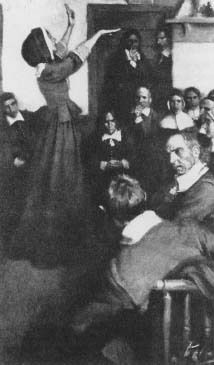Anne Hutchinson Trials: 1637 and 1638
General Court Summons Hutchinson, Church Of Boston Enters Fray, The Aftermath: A Mixed Picture
Defendant: Anne Hutchinson
Crimes Charged: "Traducing the ministers and their ministry" and heresy
Chief Defense Lawyer: None
Chief Prosecutors: Civil trial: John Winthrop; religious trial: the Reverend John Davenport
Judges: Civil trial: John Winthrop and the Magistrates of Massachusetts; religious trial: John Wilson and the ministers of the Church of Boston
Places: Civil trial: Newtown (Cambridge); religious trial: Boston
Dates of trials: Civil trial: November 7-8, 1637; Religious trial: March 22, 1638
Verdicts: Guilty
Sentences: Banishment from the colony and excommunication from the Church of Boston
SIGNIFICANCE: Anne Hutchinson was the defendant in the most famous of the trials intended to squelch religious dissent in the Massachusetts Bay Colony.
The Massachusetts Bay Colony had been founded so that the Puritans might perfectly practice their own faith. Religious liberty for others—a concept Americans would later take for granted—was not part of the Puritans' plan. Instead, founding Governor John Winthrop envisioned a model "Citty [sic] upon a hill," an example of Christian unity and order. Not incidentally, women were expected to play a submissive and supporting role in this society.
Anne Hutchinson, a skilled midwife and herbal healer with her own interpretation of Puritan doctrine, challenged the leaders of this "wilderness theocracy," as Barbara Ritter Dailey describes it. She arrived in the colony in 1634 and began holding religious meetings in her home. She quickly drew crowds of 60 to 80 men and women on a weekly basis. An alarmed assembly of church elders agreed that "women might meet [some few together] to pray and edify one another" but, without naming Hutchinson, denounced "one woman … [who] took upon her the whole exercise … [as] disorderly, and without rule."
Hutchinson continued to outline her views. Puritan doctrine emphasized the performance of "good works," which might be interpreted as evidence, or justification, that an individual had been elected for salvation. Hutchinson's favorite minister, John Cotton, stressed a "covenant of grace"—the idea that one's own spiritual consciousness of God's election might also be justification. Hutchinson expanded this idea to include an in-dwelling Holy Ghost whose guidance replaced the self-will of the saved. She then denounced all of the colony's ministers except Cotton and her brother-in-law, John Wheelwright, for preaching only the "Covenant of Works."
 Anne Hutchinson preaching.
Anne Hutchinson preaching.
Additional topics
- Boston Massacre Trials: 1770 - Snowballs, Then Musket Balls Fly, The Redcoats Are Indicted, Captain Preston's Trial
- Alien and Sedition Acts: 1798
- Anne Hutchinson Trials: 1637 and 1638 - General Court Summons Hutchinson
- Anne Hutchinson Trials: 1637 and 1638 - Church Of Boston Enters Fray
- Anne Hutchinson Trials: 1637 and 1638 - The Aftermath: A Mixed Picture
- Anne Hutchinson Trials: 1637 and 1638 - Suggestions For Further Reading
- Other Free Encyclopedias
Law Library - American Law and Legal InformationNotable Trials and Court Cases - 1637 to 1832